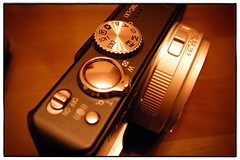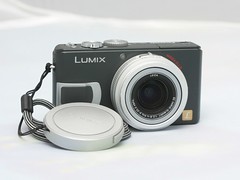Difference between revisions of "Panasonic DMC-LX1"
m (link to lx2) |
Hanskerensky (talk | contribs) (Added link to user manual page) |
||
| (3 intermediate revisions by 3 users not shown) | |||
| Line 8: | Line 8: | ||
}} | }} | ||
| − | The '''Panasonic DMC-LX1''' from [[Matsushita]] is an 8 | + | The '''Panasonic DMC-LX1''' released from [[Matsushita]] is an 8 [[megapixel]] digital compact camera. It spawned several "LX" models to follow. When introduced in 2005, it was the first compact to offer a 16:9 aspect ratio and was the smallest camera to provide [[RAW]] file format. It uses a [[Leica]] DC Vario-Elmarit 6.3-25.2 mm (28-112 mm 16:9, 34-136mm 4:3), f/2.8 - f/4.9 (4x) zoom lens with optical image stabilization. Images can be captured with a maximum resolution of 3840 x 2160 in 16:9, 3248 x 2160 3:2 or 2880 x 2160 in 4:3. The top of the lens barrel has a three position switch to change between 16:9, 3:2 and 4:3 formats. Along with RAW, [[TIFF]] and Jpeg film formats are also supported. The top of the camera has a switch that releases the built-in flash. The back has a 207,000 pixels pixel, 2.5" TFT LCD screen. Removable storage is with [[Secure Digital|SD]] and [[MMC]] cards. A 32MB card is usually supplied. It can be accessed on the base of the camera and share the space with the CGR-S005A 3.7V 1150 mAh lithium-ion battery. |
The LX1 has a [[Leica]] counterpart, the [[Leica D-Lux 2]], and apart from some cosmetic differences both cameras appear to be the same, including the Leica lens. | The LX1 has a [[Leica]] counterpart, the [[Leica D-Lux 2]], and apart from some cosmetic differences both cameras appear to be the same, including the Leica lens. | ||
The [[Panasonic DMC-LX2]] was available a year later. | The [[Panasonic DMC-LX2]] was available a year later. | ||
| − | + | ||
| − | + | ||
{{Flickr_image | {{Flickr_image | ||
|image_source= http://www.flickr.com/photos/mann_lau/557979763/in/pool-camerawiki | |image_source= http://www.flickr.com/photos/mann_lau/557979763/in/pool-camerawiki | ||
| Line 34: | Line 34: | ||
{{br}} | {{br}} | ||
== Links == | == Links == | ||
| + | *[https://www.manualslib.com/products/Panasonic-Lumix-Dmc-Lx1-2442026.html Panasonic Lumix DMC-LX1 user manual] at [https://www.manualslib.com/ Manualslib] | ||
*[http://www.dpreview.com/reviews/panasoniclx1/ Reviewed] at [http://www.dpreview.com/ DPReview.com] | *[http://www.dpreview.com/reviews/panasoniclx1/ Reviewed] at [http://www.dpreview.com/ DPReview.com] | ||
* [http://www.botzilla.com/blog/archives/000479.html LX1 Notes and links on Botzilla] | * [http://www.botzilla.com/blog/archives/000479.html LX1 Notes and links on Botzilla] | ||
| Line 39: | Line 40: | ||
[[Category: Japanese digital]] | [[Category: Japanese digital]] | ||
| − | [[Category: | + | [[Category:Panasonic|Lumix DMC-LX1]] |
| − | [[Category: Panasonic]] | + | [[Category:L|Lumix DMC-LX1 Panasonic]] |
[[Category: D|Dmc-Lx1]] | [[Category: D|Dmc-Lx1]] | ||
Latest revision as of 06:02, 25 October 2021

|
| image by Caballero2105 (Image rights) |
The Panasonic DMC-LX1 released from Matsushita is an 8 megapixel digital compact camera. It spawned several "LX" models to follow. When introduced in 2005, it was the first compact to offer a 16:9 aspect ratio and was the smallest camera to provide RAW file format. It uses a Leica DC Vario-Elmarit 6.3-25.2 mm (28-112 mm 16:9, 34-136mm 4:3), f/2.8 - f/4.9 (4x) zoom lens with optical image stabilization. Images can be captured with a maximum resolution of 3840 x 2160 in 16:9, 3248 x 2160 3:2 or 2880 x 2160 in 4:3. The top of the lens barrel has a three position switch to change between 16:9, 3:2 and 4:3 formats. Along with RAW, TIFF and Jpeg film formats are also supported. The top of the camera has a switch that releases the built-in flash. The back has a 207,000 pixels pixel, 2.5" TFT LCD screen. Removable storage is with SD and MMC cards. A 32MB card is usually supplied. It can be accessed on the base of the camera and share the space with the CGR-S005A 3.7V 1150 mAh lithium-ion battery.
The LX1 has a Leica counterpart, the Leica D-Lux 2, and apart from some cosmetic differences both cameras appear to be the same, including the Leica lens.
The Panasonic DMC-LX2 was available a year later.

|
| Top controls image by Boris Lau (Image rights) |

|
| image by imppact (Image rights) |